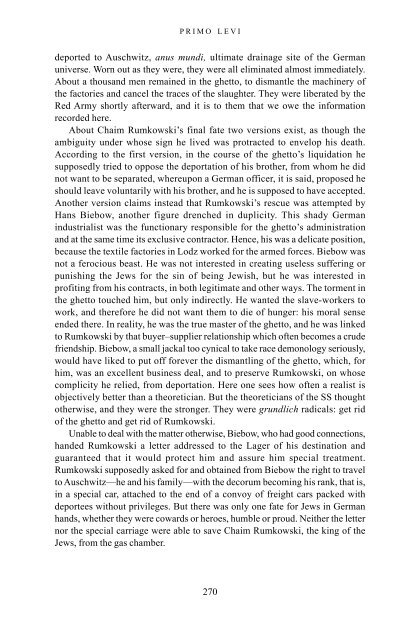The_Holokaust_-_origins,_implementation,_aftermath
The_Holokaust_-_origins,_implementation,_aftermath
The_Holokaust_-_origins,_implementation,_aftermath
Create successful ePaper yourself
Turn your PDF publications into a flip-book with our unique Google optimized e-Paper software.
PRIMO LEVI<br />
deported to Auschwitz, anus mundi, ultimate drainage site of the German<br />
universe. Worn out as they were, they were all eliminated almost immediately.<br />
About a thousand men remained in the ghetto, to dismantle the machinery of<br />
the factories and cancel the traces of the slaughter. <strong>The</strong>y were liberated by the<br />
Red Army shortly afterward, and it is to them that we owe the information<br />
recorded here.<br />
About Chaim Rumkowski’s final fate two versions exist, as though the<br />
ambiguity under whose sign he lived was protracted to envelop his death.<br />
According to the first version, in the course of the ghetto’s liquidation he<br />
supposedly tried to oppose the deportation of his brother, from whom he did<br />
not want to be separated, whereupon a German officer, it is said, proposed he<br />
should leave voluntarily with his brother, and he is supposed to have accepted.<br />
Another version claims instead that Rumkowski’s rescue was attempted by<br />
Hans Biebow, another figure drenched in duplicity. This shady German<br />
industrialist was the functionary responsible for the ghetto’s administration<br />
and at the same time its exclusive contractor. Hence, his was a delicate position,<br />
because the textile factories in Lodz worked for the armed forces. Biebow was<br />
not a ferocious beast. He was not interested in creating useless suffering or<br />
punishing the Jews for the sin of being Jewish, but he was interested in<br />
profiting from his contracts, in both legitimate and other ways. <strong>The</strong> torment in<br />
the ghetto touched him, but only indirectly. He wanted the slave-workers to<br />
work, and therefore he did not want them to die of hunger: his moral sense<br />
ended there. In reality, he was the true master of the ghetto, and he was linked<br />
to Rumkowski by that buyer–supplier relationship which often becomes a crude<br />
friendship. Biebow, a small jackal too cynical to take race demonology seriously,<br />
would have liked to put off forever the dismantling of the ghetto, which, for<br />
him, was an excellent business deal, and to preserve Rumkowski, on whose<br />
complicity he relied, from deportation. Here one sees how often a realist is<br />
objectively better than a theoretician. But the theoreticians of the SS thought<br />
otherwise, and they were the stronger. <strong>The</strong>y were grundlich radicals: get rid<br />
of the ghetto and get rid of Rumkowski.<br />
Unable to deal with the matter otherwise, Biebow, who had good connections,<br />
handed Rumkowski a letter addressed to the Lager of his destination and<br />
guaranteed that it would protect him and assure him special treatment.<br />
Rumkowski supposedly asked for and obtained from Biebow the right to travel<br />
to Auschwitz—he and his family—with the decorum becoming his rank, that is,<br />
in a special car, attached to the end of a convoy of freight cars packed with<br />
deportees without privileges. But there was only one fate for Jews in German<br />
hands, whether they were cowards or heroes, humble or proud. Neither the letter<br />
nor the special carriage were able to save Chaim Rumkowski, the king of the<br />
Jews, from the gas chamber.<br />
270



